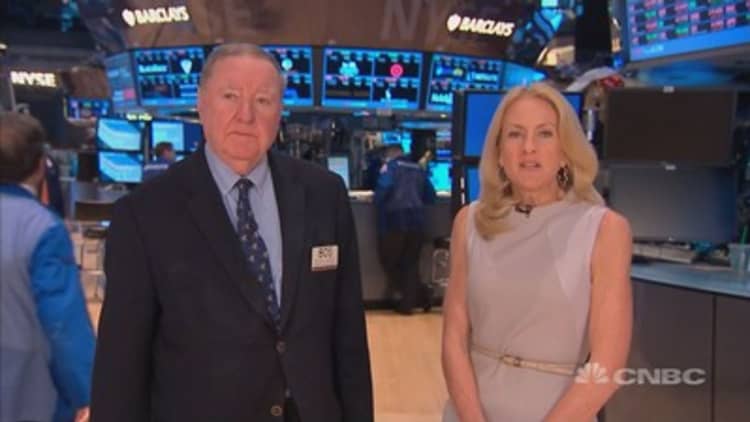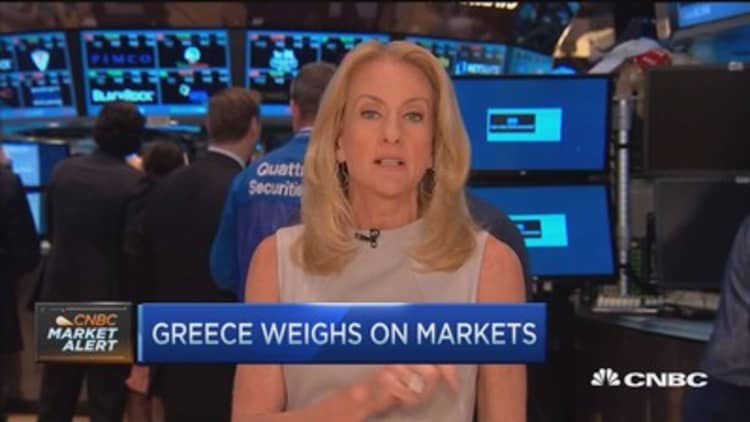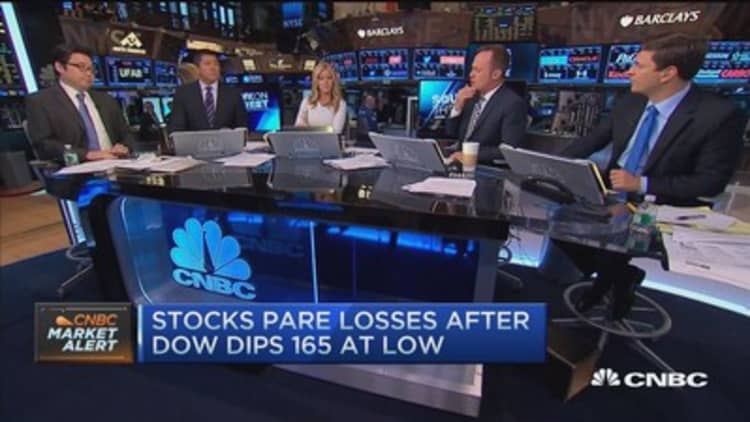



U.S. stocks closed mildly lower on Monday, recovering from sharp opening losses on selloff overseas, as traders shook off concerns of contagion from the Greece debt crisis. (Tweet This)
"I think there's still some negative overhang from Greece even though at this point investors aren't as nervous as they have been in the past," said Ben Garber, capital markets economist at Moody's Analytics.
Energy traded about 1.3 percent lower as the worst decliner in the S&P 500. WTI crude plunged 7.7 percent in its second-worst day of the year to settle at $52.23 a barrel amid the Iran nuclear deal negotiations, the Greece debt drama and volatility in Chinese stocks.
5-day performance of WTI crude
The major averages fell back into negative territory after briefly trading in the black.
The Nasdaq traded about 0.7 percent lower as the iShares Nasdaq Biotechnology ETF (IBB) struggled to hold onto a brief jump of more than 1 percent.
"I think the markets are trading (off the idea that) it's just the next round of negotiations," said Alan Skrainka, chief investment officer at Cornerstone Wealth Management. "It seems to me the markets are taking this in stride because they believe the events in Greece will not have knock-on effects for Europe, or the U.S. for that matter."
"There's a lot of cash on the sidelines," he said. "Many investors who have been left out of the bull market see a little correction (and are) taking advantage of this dip."
The Dow Jones industrial average closed about 46 points lower, falling below its 200-day moving average. However, the index did recover from a 150-point decline soon after the market open.
The Dow transports gave up early gains to close about half a percent lower, remaining below its 200-day moving average.
Futures recovered in morning trade, with the Dow futures about 160 points lower after falling more than 200 points Sunday evening.
"This is a 'it could have been worse' scenario," said Art Hogan, chief market strategist at Wunderlich Securities. "But the question is what's next. To me it's very much trying to ascertain what next steps are. We may get some good news over the next 48 hours."
In a Sunday referendum, nearly two-thirds of Greeks voted "no," rejecting a proposal from international creditors that would have required more austerity reforms for debt relief.
Lead bailout negotiator Euclid Tsakalotos was appointed Greece's next finance minister after Yanis Varoufakis resigned on Monday.
"Investors should brace for volatility with probability of a snapback based on ECB and Eurogroup action over the next few days," said Doug Cote, chief market strategist at Voya Investment Management. "This is not a sell signal."
Read MoreLive blog on Greece
Bond yields held lower, with the 10-year yield near 2.30 percent and the around 0.60 percent.
The U.S. dollar trimmed gains to trade flat, with the euro near $1.106.
The European Central Bank said in a Dow Jones report that it will maintain emergency liquidity assistance for Greek banks. Euro zone leaders will meet at an emergency summit on Greece Tuesday.
"Germany is still taking a hard line against Greece and that may have caused the latest selloff," said Peter Cardillo, chief market economist at Rockwell Global Capital.
"The key is not so much when talks resume (but) if the ECB increases loans," he said.
German Chancellor Angela Merkel said after a meeting with French President Francois Hollande that they respect the vote of the Greeks and the door for talks with the country remains open, Reuters reported.
Last week, Greece became the first developed nation to default on a major loan from the International Monetary Fund.
The nation's banks and stock exchange have been closed since last Monday as the government seeks to prevent a massive outflow of cash. The Greek Bank Association head said in a Reuters report that banks will remain closed on Tuesday and Wednesday, while maintaining the daily withdrawal limit of 60 euros.
The Greek rejection of the creditors' proposals weighed heavily overseas. Asian stocks outside of China fell, with the Nikkei closing about 2 percent lower and the Hang Seng down nearly 3.2 percent. European stocks closed lower, with the DAX off 1.5 percent. Italy's FTSEMIB closed in correction territory, joining France's CAC 40 and the Spain IBEX 35.
Shanghai bucked the trend in another volatile day of trade, closing up 2.42 percent but still in bear market territory.
U.S. economic data out Monday included the Institute for Supply Management's June service sector survey, which hit 56.0 in June, versus the 56.2 estimate.
Markit's services PMI for June showed a final read of 54.8.
After last Thursday's soft jobs report, investors will weigh any subsequent data points to see if support is strong enough for a September rate hike.
Major U.S. Indexes
Ahead of the unofficial start of earnings season this Wednesday, A Schulman posts results after the close.
"If we start to get better news in corporate America, it lends prospects for a little better earnings season that may be enough to ward off any negative sentiment from Europe," said Mark Luschini, chief investment strategist at Janney Montgomery Scott.
In other corporate news, Humana agreed to be bought by rival Aetna for $37 billion in cash and stock. Humana shareholders will receive $125 in cash and 0.8375 Aetna shares for each share they now hold.
Seritage Growth Properties, the real estate investment trust created by retailer Sears Holdings, will begin trading Monday on the New York Stock Exchange. Sears said the rights offering of Seritage shares expired last Thursday and that it was oversubscribed.
Read MoreEarly movers: HUM, SRG, AAPL, POT, BABA, MCD, YUM & more
Dollar Tree has received U.S. Federal Trade Commission approval to acquire rival Family Dollar Stores after a nearly year-long review. The combined company will need to divest more than 300 stores. Dollar Tree expects the deal to be completed today.
The Dow Jones Industrial Average closed down 46.53 points, or 0.26 percent, at 17,683.58, with Wal-Mart leading advancers and General Electric the greatest laggard.
The closed down 8.02 points, or 0.39 percent, at 2,068.76, with energy leading nine sectors lower and utilities the only advancer.
The Nasdaq closed down 17.27 points, or 0.34 percent, at 4,991.94.
The CBOE Volatility Index (VIX), widely considered the best gauge of fear in the market, traded below 18.
About two stocks declined for every advancer in the New York Stock Exchange, with an exchange volume of 876 million and a composite volume of about 3.4 billion in the close.
Gold futures settled up 9.70 at $1,173.20 an ounce.
—Reuters and CNBC's Peter Schacknow contributed to this report
On tap this week:
Monday
Earnings: A. Schulman
Tuesday
Earnings: Family Dollar, Helen of Troy, MSC Industrial, The Container Store
8:30 a.m.: International trade
10 a.m.: JOLTS
1 p.m.: $24 billion 3-year note auction
3 p.m.: Consumer credit
Wednesday
Earnings: Alcoa, WD-40
1 p.m.: $21 billion 10-year note auction
2 p.m.: FOMC minutes
2 p.m.: San Francisco Fed President John Williams
Thursday
Earnings: Pepsico, Walgreens Boots Alliance, PriceSmart, Cintas, Barracuda Networks
6:45 a.m.: Minneapolis Fed President Narayana Kocherlakota in Frankfurt
8:30 a.m.: Initial claims
10:15 a.m.: Fed Gov. Lael Brainard
1 p.m.: $13 billion 30-year bond auction
12:30 p.m.: Kansas City Fed President Esther George on economy and policy
Friday
10 a.m.: Wholesale trade
11:35 a.m.: Boston Fed President Eric Rosengren
12:30 p.m.: Fed Chair Janet Yellen on economy
More From CNBC.com:


